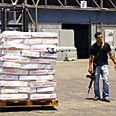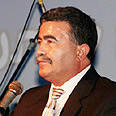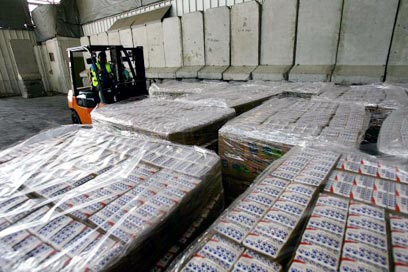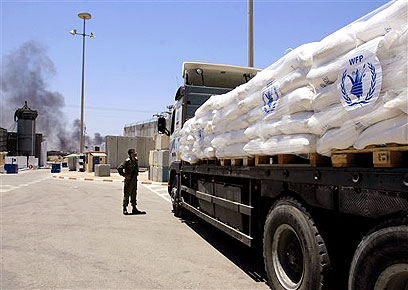
Goods at Karni Crossing
Photo: Reuters

Peretz making efforts
Photo: Ofer Amram
IDF official: No humanitarian crisis in Gaza
Palestinians often present exaggerated picture to advance their own interests, head of the Coordination and Liaison Administration, Colonel Nir Peres, tells Ynet. There is no danger of running out of flour, wheat, and other basic products, he says; fuel, dairy products and other basic necessities just delivered
There is neither hunger nor a humanitarian crisis in Gaza, head of the Coordination and Liaison Administration, Colonel Nir Peres, told Ynet on Tuesday. “There is nothing of the sort. Of course, the situation can’t really be defined as good, but a lot is being done so that nothing is lacking there.”
In the past few months, since Hamas’ victory in Palestinian Authority elections and since the new government was established under Prime Minister Ismail Haniyeh, the situation in Gaza has steadily deteriorated. Government employees have not been paid, the transfer of goods in and out of the PA has been limited due to security threats, and reports of civilians suffering from hunger have proliferated.
Colonel Peres acknowledged that he was fully aware of the criticism, both in Israel and abroad, that Israel’s offensive in Gaza was worsening the situation for Palestinian civilians, but he emphasized that Palestinians often present an exaggerated picture to advance their own interests.

Aid packages at Karni (Photo: Reuters)
“I’ve never known anyone to die because there is not sugar,” he said. “It is clear that as soon as supplies are not being regularly shipped into Gaza, the stores of food diminish. But the supply of wheat, flour and other basic products is not going to run out in a day or two, nor in four days. It changes from product to product, because it may be that there is enough sugar to last a few days but enough wheat to last two to three weeks. Of course it is difficult to say the situation is good, and I won’t pretend that it is.”
Colonel Peres explained that the challenge in transporting goods into the Gaza Strip is not directly linked to the IDF’s operation. “In the past as well there were many incidents in which the Karni Crossing was closed due to security warnings, and goods could not be delivered. The crossings here are under constant threat. In Karni there was a car bomb in April, and now there are all sorts of tunnels. Part of the issue is dealing with terrorism while simultaneously dealing with the civilian population that is not involved and needs food and other products as regularly as possible.”

Truck with goods at Erez Crossing (Photo: AP)
As part of efforts to aid the civilian population, Colonel Peres said the IDF was constantly seeking alternative methods. Thus, on Monday trucks laden with dairy products and chemicals to disinfect drinking water entered through the Karni crossing, which is not meant for goods transfer. “Today we arranged more deliveries, despite difficulties that actually come from the Palestinian side,” he said. Monday 250,000 liters of diesel fuel, 50,000 liters of benzene, and 75 tons of cooking gas were delivered through the Nahal Oz crossing.
Peretz monitoring situation
The humanitarian situation in Gaza is also occupying Defense Minister Amir Peretz, who is making efforts to aid the Palestinian population. Peretz was the one who approved the opening of the Karni Crossing last week, although it was soon closed again due to a specific terror warning. “We are pointedly allowing necessary items to enter through the Erez Crossing,” Peres explained. “Remember, though, that the offer to reopen the Kerem Shalom Crossing was rejected by the Palestinians. We explained to international organizations that there is a terminal at Kerem Shalom, and if there really is a crisis they can take the initiative and use it.”
Regarding medical supplies, Colonel Peres noted there was no absence. “We allow medical supplies and medicines to be delivered through the Red Cross. Today, for example, a truck full of medical gases entered – not that they are lacking but so that there will be more,” he said.
‘Sometimes there are internal manipulations’
Peres hinted that the Palestinians often have ulterior motives in presenting a problematic situation in reality to ten times worse. “They do things like that. It could be seen for months, not necessarily now. A while ago they claimed there was no flour and no wheat, but it was just spin. The Karni Crossing was closed and they didn’t want to receive supplies through any other crossing. Sometimes there are internal manipulations, there are cases when a salesman holds stores in a warehouse and claims there are none so the price doubles.”
The fact that since March of this year Palestinian laborers have not been allowed to enter Israel for work purposes through the Erez Crossing, on top of the difficult financial situation, should make a point to Palestinians, Peres says. “Palestinians need to realize that at the end of the day, terrorism hurts them,” he sums up. “Terror leads them to this situation. We believe they’re beginning to understand this. Here and there, it can be seen that people are questioning ‘What do we need this for?’ But not out loud, and that is what will transform the picture. But it is all part of the process.”















